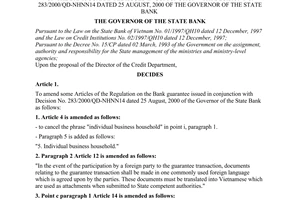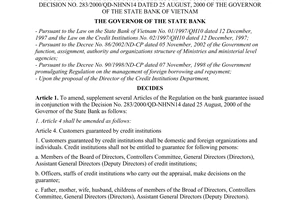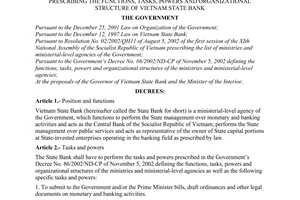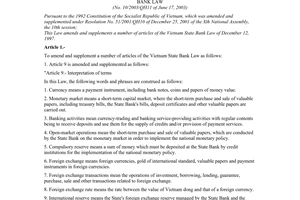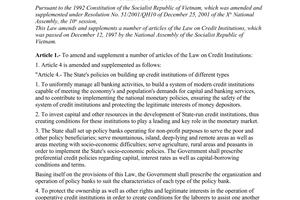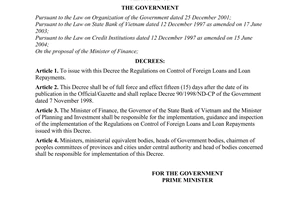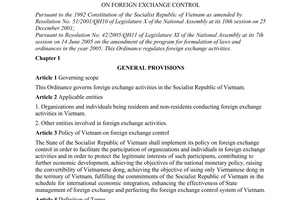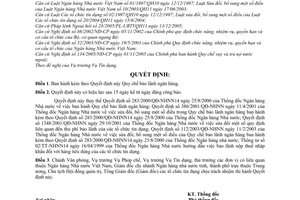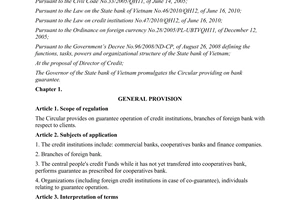Decision No. 26/2006/QD-NHNN of June 26, 2006, promulgating the regulation on bank guaranty đã được thay thế bởi Circular No. 28/2012/TT-NHNN providing on bank guarantee và được áp dụng kể từ ngày 02/12/2012.
Nội dung toàn văn Decision No. 26/2006/QD-NHNN of June 26, 2006, promulgating the regulation on bank guaranty
|
THE
STATE BANK |
OF VIET |
|
No: 26/2006/QD-NHNN |
, June 26, 2006 |
DECISION
PROMULGATING THE REGULATION ON BANK GUARANTY
THE GOVERNOR OF THE STATE BANK
Pursuant to Civil Code No. 33/2005/QH11 of
June 14, 2005;
Pursuant to December 12, 1997 Law No. 01/1997/QH10 on the State Bank of
and June 17, 2003 Law No. 10/2003/QH11 Amending and Supplementing a Number of
Articles of the Law on the State Bank of ;
Pursuant to December 12, 1997 Law No. 02/1997/QH10 on Credit Institutions and
June 15, 2004 Law No. 20/2004/QH11 Amending and Supplementing a Number of
Articles of the Law on Credit Institutions;
Pursuant to December 13, 2005 Ordinance No. 28/2005/PL-UBTVQH11 on Foreign
Exchange;
Pursuant to the Government's Decree No. 86/2002/ND-CP of November 5, 2002,
defining the functions, tasks, powers and organizational structures of
ministries and ministerial-level agencies;
Pursuant to the Government's Decree No. 52/2003/ND-CP of May 19, 2003, defining
the functions, tasks, powers and organizational structure of the State Bank of
Vietnam;
Pursuant to the Government's Decree No. 134/2005/ND-CP of November 1, 2005,
promulgating the Regulation on foreign loans and payment of foreign debts,
At the proposal of the director of the Credit Department,
DECIDES:
Article 1.- To promulgate together with this Decision the Regulation on bank guaranty.
Article 2.- This Decision takes effect 15 days after its publication in "CONG BAO."
This Decision replaces the State Bank Governor's Decision No. 283/2000/QD-NHNN14 of August 25, 2000, promulgating the Regulation on bank guaranty; Decision No. 386/2001/QD-NHNN of April 11, 2001, amending and supplementing a number of articles of the Regulation on bank guaranty, promulgated together with the State Bank Governor's Decision No. 283/2000/QD-NHNN14 of August 25, 2000; Decision No. 1348/2001/QD-NHNN of October 29, 2001, amending a number of provisions relating to the collection of guaranty charges by credit institutions; Decision No. 112/2003/QD-NHNN of February 11, 2003, amending and supplementing a number of articles of the Regulation on bank guaranty, promulgated together with the State Bank Governor's Decision No. 283/2000/QD-NHNN14 of August 25, 2000; and the State Bank Governor's Circular No. 02/TT-NHNN14 of April 16, 1999, guiding credit institutions' guaranty for payment of import tax on consumer goods.
Article 3.- The director of the Office, the director of the Legal Department, the director of the Credit Department, and heads of concerned units under the State Bank of Vietnam, directors of provincial/municipal State Bank branches, chairmen of Boards of Management and general directors (directors) of credit institutions shall have to implement this Decision.
|
FOR
THE STATE BANK GOVERNOR |
REGULATION
ON BANK GUARANTY
(Promulgated together with the State Bank Governor's Decision No.
26/2006/QD-NHNN of June 26, 2006)
Chapter I
GENERAL PROVISIONS
Article 1.- Scope of regulation
This Regulation shall apply to the performance of guaranty operations by credit institutions for their clients.
Article 2.- Interpretation of terms
In this Regulation, the terms below shall be construed as follows:
1. Bank guaranty means written undertaking made by a credit institution (guarantor) to the beneficiary (guarantee) to perform a financial obligation on behalf of a client (guaranteed) when the client fails to perform or improperly performs the obligation as committed to the guarantee. The client shall have to acknowledge the debt and repay to the credit institution the amount the latter has paid on the former's behalf.
2. Guaranty undertaking means written undertaking made by a credit institution, which may be in the form of:
a/ Letter of guaranty, which is a unilateral written undertaking made by a credit institution to perform a financial obligation on behalf of a client in case the client fails to perform or improperly performs the obligation as committed to the guarantee.
b/ Guaranty contract, which is a written agreement between a credit institution and the guarantee or between a credit institution, the guarantee, a client and related parties (if any) on the credit institution's performance of a financial obligation on behalf of the client when the client fails to perform or improperly performs the obligation as committed to the guarantee.
3. Guaranty issuance contract means a written agreement between a credit institution and a client and related parties (if any) on the rights and obligations of the parties in the making of guaranty by the credit institution for the client.
4. Guarantor means a credit institution performing guaranty operations defined in Article 3 of this Regulation.
5. Guaranteed means a client that is guaranteed by a credit institution defined in Article 4 of this Regulation.
6. Guarantee means an organization or individual at home or abroad that has the right to benefit from the guaranty issued by a credit institution.
7. Related parties mean parties related to the guaranty by a credit institution for its client, such as the counter-guarantor, the guaranty certifier, the party securing the obligation of a client to the guaranteeing credit institution and other parties (if any).
Article 3.- Credit institutions performing guaranty operations
1. Credit institutions established and operating under the Law on Credit Institutions.
2. Banks licensed by the State Bank to make international payment may provide types of guaranty involving guarantees being foreign organizations or individuals.
Article 4.- Clients guaranteed by credit institutions
1. Clients guaranteed by credit institutions may be domestic or foreign organizations and individuals. Credit institutions shall not be allowed to provide guaranty for the following persons:
a/ Members of their Management Boards, Control Boards, their general directors (directors), deputy general directors (deputy directors);
b/ Their staff involved in evaluating and making a decision to provide a guaranty;
c/ Parents, spouses or children of the members of their Management Boards, Control Boards, their general directors (directors), deputy general directors (deputy directors);
d/ The application of the provision of Point c of this Clause to the guaranteed being parents, spouses or children of directors or deputy directors of branches of credit institutions shall be considered and decided by the credit institutions themselves.
2. Restrictions on the provision of guaranty by credit institutions for their clients shall comply with the provisions of Article 78 of the Law on Credit Institutions.
Article 5.- Types of guaranty
1. Guaranty for loan borrowing means an undertaking made by a credit institution to the guarantee to pay debts on behalf of a client in case the client fails to pay debts or pays debts not in full or on time to the guarantee.
2. Payment guaranty means an undertaking made by a credit institution to a guarantee to perform a payment obligation on behalf of a client in case the client fails to perform or improperly performs its payment obligation when it falls due.
3. Guaranty for participation in bidding means an undertaking made by a credit institution to the guarantee to secure a client's obligation to participate in bidding. In case the client fails to pay a fine for breaching bidding regulations or pays it insufficiently to the bid inviter, the credit institution shall pay such fine on behalf of the client.
4. Guaranty for contract performance means an undertaking made by a credit institution to the guarantee to secure a client's proper and full performance of obligations under the contract already signed with the guarantee. In case the client that has breached the contract and has to pay damages to the guarantee fails to perform or improperly performs such obligations, the credit institution shall perform the obligations on behalf of the client.
5. Guaranty for product quality means an undertaking made by a credit institution to the guarantee to secure a client's proper realization of agreements on product quality under the contract already signed with the guarantee. In case the client that has failed to keep to product quality agreements and has to pay damages to the guarantee fails to perform or improperly performs its obligation, the credit institution shall perform such obligations on behalf of the client.
6. Guaranty for repayment of advanced amount means an undertaking made by a credit institution to the guarantee to secure a client's obligation to repay advanced amounts under the contract already signed with the guarantee. In case the client that has breached the contract and has to repay the advanced amount fails to repay or insufficiently repays such amount, the credit institution shall perform such obligation on behalf of the client.
7. Counter-guaranty means an undertaking made by a credit institution (counter-guarantor) to the guarantor to perform the financial obligation for the guarantor in case the guarantor has provided the guaranty and made payment to the guarantee on behalf of the counter-guarantor's client.
8. Guaranty certification means a guaranty undertaking made by a credit institution (the guaranty certifier) to the guarantee to secure the guarantor's capability to perform the guaranty obligation for a client.
9. Other types of guaranty which are not banned by law and are compliant with international practice.
Chapter II
SPECIFIC PROVISIONS
Article 6.- Scope of guaranty
The guarantor may undertake to guarantee part or the whole of the following obligations:
1. Obligation to pay loan principals, interests and other expenses related to loans;
2. Obligation to pay the purchase of supplies, goods, machinery, equipment and expenses for clients to carry out investment projects or plans or production, business or livelihood service plans;
3. Obligation to pay taxes and other financial obligations to the State;
4. Obligation of a client participating in bidding;
5. Obligation of a client entering into contractual relations with the guarantee, such as contract performance, product quality assurance, receipt and repayment of advanced amounts;
6. Other lawful obligations as agreed upon by the parties.
Article 7.- Guaranty limit
1. Total guaranty amount of a credit institution for a single client shall not exceed 15% (fifteen per cent) of the equity of the credit institution. Total guaranty amount of a foreign bank branch for a single client shall not exceed 15% of the equity of the foreign bank.
2. Total guaranty amount of a credit institution for a single client stated in Clause 1 of this Article shall include total guaranty amount and undertakings issued in the form of documentary credit, excluding the form of sight letter of credit for which the client has paid a collateral in full or is entitled to borrow 100% of the payment value.
Article 8.- Guaranty conditions
Credit institutions shall consider and make a decision to provide a guaranty to a client that fully meets the following conditions:
1. Having full civil legal capacity and civil act capacity as provided for by law;
2. The purpose for which the guaranty is applied is lawful;
3. Having financial capability to perform the obligation guaranteed by the credit institution during the committed duration;
4. For clients being foreign organizations or individuals, apart from the aforesaid conditions, they shall also have to observe 's regulations on foreign exchange.
Article 9.- Dossiers of application for guaranty
A client's dossier of application for guaranty shall comprise the application for guaranty and documents related to the guaranty transaction as required by the credit institution concerned. Clients shall supply full and truthful information and documents related to the guaranty as requested by credit institutions and bear responsibility for the accuracy of such information and documents.
Article 10.- Guaranty issuance contract
1. A guaranty issuance contract shall be agreed upon by the guarantor, client and related parties (if any), covering the following contents:
a/ Names and addresses of the guarantor and client and time of signing of the contract;
b/ Guaranty amount, term and charge;
c/ Purpose for which the guaranty is issued;
d/ Conditions for performance of the guaranty obligation;
e/ Form of security for the client's obligation to the guaranteeing credit institution and the value of security asset;
f/ Rights and obligations of the parties;
g/ Provisions on the client's repayment after the credit institution performs the guaranty obligation;
h/ Provisions on the settlement of arising disputes;
i/ Transfer of rights and obligations of the parties;
j/ Other agreements.
2. Guaranty issuance contracts may be amended, supplemented or cancelled as agreed upon by the concerned parties.
Article 11.- Forms and contents of guaranty
1. Bank guaranty shall be made in writing in the following forms:
a/ Guaranty contract;
b/ Letter of guaranty;
c/ Other forms which are not banned by law and are compliant with international practice.
2. Contents of guaranty include:
a/ Names and addresses of the credit institution, client and guarantee;
b/ Date of issue of guaranty and amount of guaranty money;
c/ Forms of and conditions for performance of the guaranty obligation;
d/ Guaranty term;
e/ Apart from the aforesaid contents, a guaranty undertaking may cover other contents such as rights and obligations of the parties; settlement of arising disputes; transfer of rights and obligations of the parties; and other agreements.
3. Bank guaranties may be amended, supplemented or cancelled as agreed upon by the concerned parties.
Article 12.- Co-guaranty
1. Co-guaranty means joint guaranty by several credit institutions for a single obligation of a client through a principal credit institution.
2. The proposition, coordination and procedures for organizing co-guaranty shall comply with the State Bank's regulations on co-financing.
3. Co-guaranteeing credit institutions shall take joint responsibility for performing the guaranty obligation, unless otherwise agreed upon or they guarantee independent parts. In case the principal credit institution has performed the guaranty obligation on behalf of the client, the co-guaranteeing credit institutions shall have to repay the principal credit institution amounts of money in proportion to their co-guaranty ratios as agreed upon by the parties.
Article 13.- Guaranty for a single obligation which several clients jointly perform and bear joint responsibility for
A credit institution may guarantee a single obligation which several clients perform and bear joint responsibility for under a joint responsibility contract between the parties, on the basis of considering the prestige and financial capability of each contractual party; or accept the counter- guaranty issued by counter-guarantors to their clients or other agreements of the clients.
Article 14.- Competence to endorse guaranty
1. The representative at law of a credit institution shall have competence to sign guaranty documents of the credit institution.
2. The representative at law of a credit institution may authorize or issue written regulations defining the competence to sign credit institution's guaranty documents of title holders within the credit institution system in accordance with the provisions of law.
Article 15.- Securing of client's obligations to guaranteeing credit institutions
1. Credit institutions and clients shall agree upon the application or non-application of measures to secure the client's obligations to the guaranteeing credit institution.
2. Measures to secure clients' obligations to the guaranteeing credit institution shall include pledge of property, mortgage of property, a third party's guaranty, collateral and other security measures as provided for by law.
Article 16.- Guaranty charges
1. The guarantor shall negotiate guaranty charges with clients in compatibility with credit institutions' expenses and the degree of risk of the guaranty operation.
2. In case of counter-guaranty or guaranty certification, the levels of guaranty charges shall be agreed upon by the parties on the basis of the guaranty charge levels which the clients have accepted to pay.
3. Co-guaranteeing parties shall agree upon the portions of the guaranty charge which each party shall be entitled to on the basis of agreement on each party's co-guaranty participation ratio and the charge amount collected from the client.
4. In case a credit institution guarantees a single obligation jointly performed by several clients, the credit institution shall reach agreement with each of such clients on the payable charge on the basis of each client's obligation in the joint responsibility contract between these clients.
Article 17.- Order and procedures for issuance of guaranty
Credit institutions shall issue specific regulations on the order and procedures for evaluation and issuance of guaranty to clients in accordance with the characteristics of each credit institution and each type of guaranty.
Article 18.- Guaranty term
1. The guaranty term shall start from the time of issuance of guaranty to the time of termination of guaranty as indicated in the guaranty undertaking. In case a guaranty undertaking does not specify the time of termination of guaranty, this time shall be the time of termination of the guaranty obligation defined in Article 20 of this Regulation.
2. Extension of the guaranty term shall be agreed upon by the involved parties.
Article 19.- Exemption from performance of the guaranty obligation
1. In case the guarantee exempts the guarantor from performing the guaranty obligation, the guaranteed shall still have to perform its obligations to the guarantor, unless otherwise agreed upon or provided for by law on the joint performance of guaranty obligations.
2. In case one of credit institutions that co-guarantee a client's obligation is exempted from performing its guaranty obligation, the other credit institutions shall still have to perform their guaranty obligations.
Article 20.- Termination of guaranty obligations
A credit institution's guaranty obligation shall terminate in the following cases:
1. The client has fully performed the obligation to the guarantee;
2. The credit institution has performed the guaranty obligation according to the guaranty undertaking;
3. The guaranty is cancelled or replaced with another security measure;
4. The guaranty term has expired;
5. The guarantee agrees to exempt the guarantor from performing the guaranty obligation or the guaranty obligation has terminated according to the provisions of law;
6. As agreed upon between the involved parties.
Article 21.- Use of language
1. Documents related to guaranty transactions shall be made in Vietnamese;
2. In case there is a foreign party, the involved parties may agree to use a common foreign language in documents related to guaranty transactions.
Article 22.- Application of treaties and international practice to guaranty transactions involving foreign parties
1. Where treaties pertaining to guaranty which the Socialist Republic of Vietnam has signed or acceded to contain provisions different from those of this Regulation, the provisions of such treaties shall apply.
2. The parties may agree to apply international rules, customs and practice related to bank guaranty, provided that such rules, customs and practice are not contrary to the provisions of Vietnamese law.
3. The parties may agree on applicable foreign laws, foreign courts or arbitration to settle disputes arising from guaranty transactions, provided that such agreement is not contrary to the provisions of Vietnamese law.
Article 23.- Rights and obligations of the guarantor
1. The guarantor shall have the following rights:
a/ To accept or decline a client's or counter-guarantor's request for guaranty;
b/ To request the guaranty certifier to certify guaranty for the guarantor's amount guaranteed for the client;
c/ To request clients to supply documents and information related to the guaranty evaluation and security assets (if any);
d/ If necessary, to request clients to take measures to secure the obligation guaranteed by the credit institution;
e/ To collect guaranty charges as agreed upon;
f/ To debit and request the client or the counter-guarantor to repay the amounts already paid by the guarantor on behalf of the client or counter-guarantor;
g/ To dispose of security assets of clients as agreed upon and provided for by law;
h/ To initiate lawsuits in accordance with the provisions of law when a client or the counter-guarantor breaches the committed obligation;
i/ To transfer its rights or obligations to another credit institution when it is so approved in writing by the involved parties.
2. The guarantor shall have the following obligations:
a/ To perform the guaranty obligation according to the guaranty undertaking;
b/ To fully return security assets (if any) and related documents to clients when liquidating guaranty issuance contracts.
Article 24.- Rights and obligations of the counter-guarantor
1. The counter-guarantor shall have the following rights:
a/ To accept or decline a client's request for issuance of counter-guaranty;
b/ To request the guarantor to issue guaranty for the obligation of the counter-guarantor's client to the guarantee;
c/ To request clients to supply documents and information related to the counter-guaranty evaluation and security assets (if any);
d/ If necessary, to request clients to take measures to secure the obligation counter-guaranteed by the credit institution;
e/ To collect guaranty charges as agreed upon;
f/ To debit and request clients to repay the amounts already paid by the counter-guarantor in performing the counter-guaranty obligation to the guarantor;
g/ To dispose of security assets of clients as agreed upon and provided for by law;
h/ To initiate lawsuits in accordance with the provisions of law when a client or the guarantor breaches the committed obligation;
i/ To transfer its rights or obligations to another credit institution when it is so approved in writing by the involved parties.
2. The counter-guarantor shall have the following obligations:
a/ To perform the counter-guaranty obligation as committed;
b/ To fully return security assets (if any) and related documents to clients when liquidating guaranty issuance contracts.
Article 25.- Rights and obligations of the guaranty certifier
1. The guaranty certifier shall have the following rights:
a/ To accept or decline the guarantor's or client's request for guaranty certification;
b/ To request clients or the guarantor to supply documents and information related to the evaluation of the guaranty and security assets (if any);
c/ To request clients or the guarantor to take measures to secure the obligation for which the credit institution has given guaranty certification;
d/ To reach agreement with the guarantor or clients or both on the guaranty certification obligation, guaranty certification charges, and the order and procedures for repayment of the guaranty certification obligation already performed by the guaranty certifier to the guarantee;
e/ To request clients or the guarantor to repay the amounts of money already paid by the guaranty certifier on their behalf;
f/ To debit the guarantor or clients amounts already paid by the guaranty certifier on their behalf;
g/ To dispose of security assets of clients or the guarantor as agreed upon and provided for by law;
h/ To initiate lawsuits in accordance with the provisions of law when a client or the guarantor breaches the committed obligation;
i/ To transfer its rights or obligations to another credit institution when it is so approved in writing by the involved parties.
2. The guaranty certifier shall have the following obligations:
a/ To perform the guaranty obligation as committed;
b/ To fully return security assets (if any) and related documents to clients or the guarantor when liquidating guaranty issuance contracts.
Article 26.- Rights and obligations of the client
1. The client shall have the following rights:
a/ To request the credit institution to issue guaranty for the client;
b/ To request the credit institution to properly perform the guaranty undertaking and agreements reached in the guaranty issuance contract;
c/ To initiate lawsuits in accordance with the provisions of law when the credit institution breaches the committed obligation;
d/ To transfer its rights or obligations when it is so approved in writing by the involved parties.
2. The client shall have the following obligations:
a/ To supply full, accurate and truthful documents and information at the request of the guaranteeing credit institution;
b/ To perform fully and on time the obligation already committed to the guarantee;
c/ To pay fully and on time the guaranty charge to the credit institution as agreed upon;
d/ To acknowledge debts and repay to the credit institution amounts of money which the credit institution has paid on behalf of the client, including the principal, interest and expenses directly incurred in the performance of the guaranty obligation;
e/ To submit to the supervision and control by and report activities related to guaranty transactions to the guaranteeing credit institution.
Article 27.- Performance of guaranty obligations
1. During the guaranty term, the guarantor or guaranty certifier shall perform the guaranty obligation when the guarantee produces a claim for performance of the guaranty obligation and enclosed documents (if any) which fully satisfy the conditions specified in the guaranty undertaking.
2. In case the parties agree to apply international rules, customs and practice concerning bank guaranty, the order and procedures for performing the guaranty obligation shall comply with such international rules, customs and practice.
3. Immediately after performing the guaranty obligation, the credit institution shall inform and debit the client or the guaranty-requesting credit institution (referred collectively to as the debtor) the amount of money the credit institution has paid on behalf of such client or credit institution, after deducting the retained deposited amount (if any).
4. The debtor shall be obliged to promptly repay the amount already paid by the credit institution on behalf of the debtor. If it fails to promptly repay such amount to the credit institution, it shall have to pay a penalty interest on the debt which the credit institution has paid on its behalf at a rate not exceeding 150% of the interest rate indicated in the loan borrowing contract between the client and the guarantee (in case of guaranty for loan borrowing) or of the ordinary interest rate currently applied by the guarantor, calculated from the date the credit institution paid such debt.
Chapter III
INSPECTION, SUPERVISION AND REPORTING REGIMES
Article 28.- Regime of inspection and supervision of guaranty amounts:
1. Clients shall submit to the inspection and supervision by guaranteeing credit institutions during the guaranty term.
2. Credit institutions shall submit to the inspection and supervision by the State Bank according to current regulations.
Article 29.- Accounting and reporting regimes
1. The accounting and monitoring of guaranty amounts of credit institutions shall comply with current regulations.
2. Credit institutions shall review their guaranty activities and report them to the State Bank according to the current reporting regime.
Chapter IV
IMPLEMENTATION PROVISIONS
Article 30.- Tasks of Departments of the State Bank
1. The Credit Department shall have to coordinate with other departments of the State Bank and provincial/municipal State Bank branches in deploying and guiding the implementation of this Regulation.
2. The State Bank of shall have to coordinate with the Credit Department in supervising the implementation of this Regulation.
Article 31.- Organization of implementation
Credit institutions and clients shall have to implement this Regulation. On the basis of this Regulation and relevant legal provisions, credit institutions shall issue documents guiding in detail professional operations suitable to their operation conditions, characteristics and charters.
Article 32.- Amendment and supplementation
Amendment and supplementation of this Regulation shall be considered and decided by the Governor of the State Bank.




